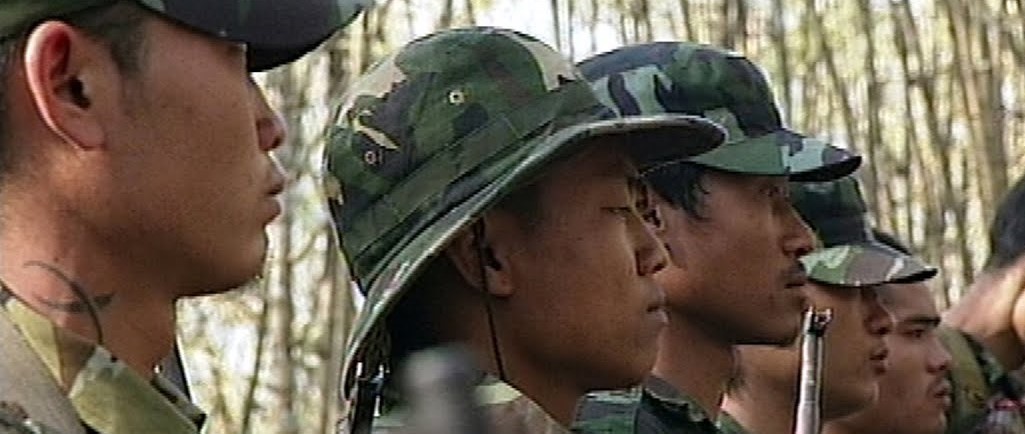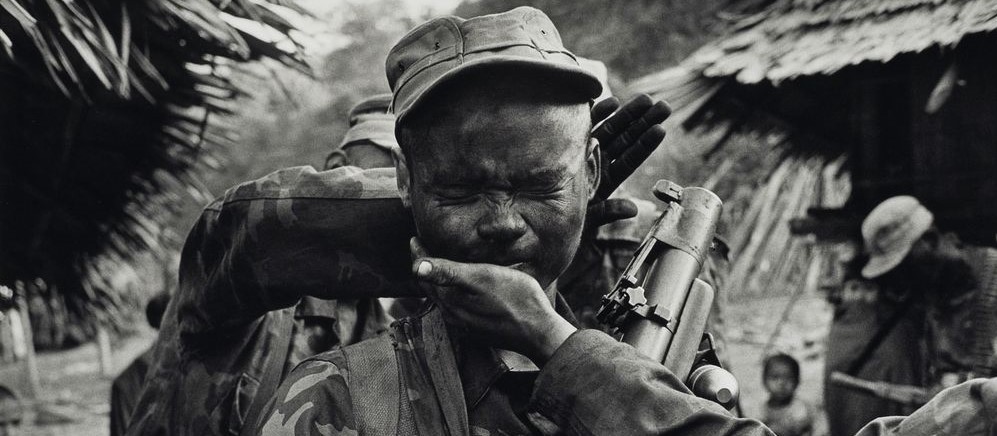
Karens War
by Simeone Andrulli
The morning biting cold wakes Monkyaw up. A dust layer still covers his skin. The thin blanket that kept him warm during the night is folded and laid down a nook. A glance at the mountains still enveloped in the acrid smoke of woods in flames and down the stairs.
"My shoes, where are my shoes?"
The dogs had taken and hidden them in the bushes. A desperate search but in the end victorious. The dog doesn't want to give up the booty but a firm kick puts an end to the dispute. It is still cold. Mankyaw refrain from washing in the brook. What importance can some dust have?! It keeps warm. He shoulders his rifle and wanders away among the jungle trees. Another day of was has just begun, the Karen war.
The Karen are one of the 138 ethnic minorities making up the composite
ethnographic scenario of Myanmar (Burma). Having maintained only an oral tradition until a few decades ago, their origin have been enriched by myths and legends. According to the most substantiated version they are of Tybetan descent and by 500 B.C. lived along the western flank of the Chinese Empire. Later they migrated southwards in successive waves and settled in the mountainous territories near the Thai-Burmese border and in the Irrawady delta area.
The "peaceful" cohabitation of the Karen with the Burman majority (2/3 of the Burmese population) broke off after WW2. The British did not allow the Karen to carve up their own homeland out of Burma and at dawn of Burma's independence declaration, January 4, 1948, hostilities flared up. The low-intensity war that followed, had ups and downs for both parties and among the several minorities fighting the central government, only the Karen persist unabated their struggle for an independent homeland.
I had the chance to familiarize with Mankyaw. He was the only one to speak a good English. The night prior his departure, we shared the meal. The dinner was rice infested by minuscule insects illuminated by an old oil lamp; young soldiers were exchanging brief and concise phrases spaced out by eloquent silences. Monkyaw was born in a Karen village of the Irrawady delta, not far from the capital Rangoon (Yangoon) and 3 years ago he joined the K.N.A. (Karen National Army). Three of his brothers lost their lives in armed clashes against S.L.O.R.C. (State, Law & Order Restoration Council) troops and the father died in prison following tortures. There weren't signs of hatred on his young face. One year ago he married a young Thalaku woman. This Karen tribe still keeps traditions and costumes that were common to all Karen before the exodus from the Gobi desert and they guard in a sanctuary holy relics.
By his questions about Italian women I understand that a man burning with passion conceals behind the moral speeches. His passion pushed him to court Nawlahel, the Thalaku girl. He helped her to build her bamboo hut. Orphan of both parents, she ended up alone in the storm of war. Mankyaw was a precious help to her but staying beside her too long required an adequate'responsible' behavior and so he married her.
Memories of caresses and sweet moments spent with her, surfaced on his face from time to time. Because of his marriage he could not go anymore to Bangkok to study computer science as promised by a Karen chief. The mother lives in a refugee camp near Mae Sot in Thailand and had never forgiven him for having wasted his one-time life chance. Mankyaw doesn't want to talk about it.
A sigh hisses between his lips, the eyes half-closed for an instant. The cold light of full moon filters through the dense rustling foliage letting us catch a glimpse of a faded horizon in the distance.
"How is life in Italy?"
Should I tell him of TV, hi-fi systems, running water, supermarkets, large paved roads, Ferrari ect. ? No, better not, there no such a perfect world.
In Kyadow, the enclave capital, there is a medieval feeling: streets with carts pulled by oxen and even a passer-by rises dust clouds, no electricity, water extracted by well or creek. The omnipresent coke and 7up are along the ice cubes floating on sugar-cane drinks the only existence proofs of hundreds years away world.
A 13 years old boy enters the patio, bowing in sign of respect to those present. He fetches one of the rifles hung on the wall and start to oil it. "Until a year ago he played with wooden rifle" says a middle-aged officer with a severe and calm tone of voice, while watching pleased the recruit's dexterity in handling the rifle. The Karen at the age of 8 begin a 4 year long period of training. At 12 they are ready for war. My teenage made of textbooks, summer holidays, teenager's love stories, soccer games looked like a rare privilege. A wooden rifle instead of a soccer ball. In the village men are few.
Before going to bed Mankyaw told me that his wife was pregnant. He will soon go to see her. He stares for a while the extinguishing flame of the oil lamp. "Don't forget us" were the last words he told me before disappearing in the forest chiaroscuro.
Author & Designer: Simeone Andrulli
tymbaryon@gmail.com
© Tymbaryon
